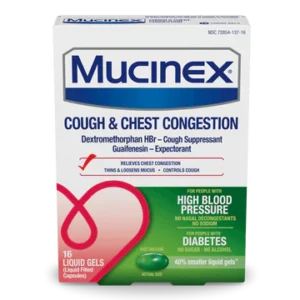Guaifenesin is an expectorant commonly used to relieve chest congestion associated with respiratory conditions such as colds, bronchitis, and other respiratory infections. This drug profile provides an overview of guaifenesin, including its uses, mechanism of action, dosage, side effects, and brand names.
What is Guaifenesin?
Guaifenesin is a pharmaceutical agent that facilitates the thinning and loosening of mucus within the airways, thereby aiding in the expulsion of mucus and the clearance of the respiratory passages. Furthermore, it is available in both over-the-counter (OTC) and prescription formats.
Chemical Composition
Guaifenesin is a simple chemical compound, chemically classified as a glyceryl ether. It is typically formulated in oral tablets, syrups, and extended-release versions.
Uses of Guaifenesin
- Relieves Chest Congestion
It is primarily used to alleviate chest congestion caused by excess mucus production in the respiratory tract. Thus, it helps to thin the mucus, making it easier to cough up and clear the airways.
- Cough Relief
It is commonly found in combination with other medications in cough syrups and cold remedies. It helps to reduce the severity of coughs caused by mucus accumulation.
- Treatment for Respiratory Infections
Guaifenesin can be used to manage symptoms of respiratory infections, such as the common cold, acute bronchitis, and other conditions that cause mucus buildup in the airways.
Mechanism of Action
Guaifenesin works by stimulating the mucus membranes in the respiratory tract. This leads to an increase in the volume and reduction of the viscosity (thickness) of mucus. As a result, the mucus becomes thinner and more easily expelled from the airways, improving breathing and reducing coughing.
Dosage and Administration
Recommended Dosage
- Adults and Children 12 years and older: 200-400 mg every 4 hours, not exceeding 2,400 mg per day.
- Children (6-12 years): 100-200 mg every 4 hours, not exceeding 1,200 mg per day.
- For children aged 2 to 6 years, the recommended dosage is 50 to 100 mg every four hours, with a maximum daily limit of 600 mg..
- Children under 2 years: Consult a doctor for appropriate dosage.
Administration Guidelines
It is recommended that guaifenesin be ingested orally with an entire glass of water. The absorption is best with fluids, which further help in loosening mucus. Crushing or chewing extended-release formulations is not advisable.
Side Effects of Guaifenesin
Although guaifenesin is typically well-accepted by patients, it has the potential to induce certain side effects.
Common Side Effects
- Nausea or vomiting
- Dizziness or lightheadedness
- Headache
- Stomach pain
Serious Side Effects
- Allergic reactions (rash, swelling, difficulty breathing)
- Severe dizziness or fainting
- Difficulty swallowing
Should any of these symptoms manifest, it is crucial to obtain medical assistance without delay.
Warnings and Precautions
- Dehydration: Guaifenesin should be taken with adequate amounts of fluids to avoid dehydration.
- Pregnancy and Breastfeeding: Pregnant or breastfeeding women should consult a healthcare provider before using guaifenesin.
Drug Interactions of Guaifenesin
Guaifenesin can interact with certain medications. It is vital to notify your healthcare provider regarding all the medications you are taking.
- Cough suppressants: Combining guaifenesin with cough suppressants like dextromethorphan may increase side effects.
- Other cold medications: Using multiple cold medications together could lead to accidental overdose.
It is essential to adhere to the instructions provided on the label or as directed by your healthcare professional.
Brand Names of Guaifenesin
Below is a table of some common brands along with their specifications:
| Brand Name | Formulation | Strength | Indication |
| Mucinex | Extended-Release Tablet | 600 mg | Chest Congestion, Cough Relief |
| Robitussin | Syrup, Oral Tablet | 100 mg, 200 mg | Cough, Chest Congestion |
| Tussin | Syrup, Oral Tablet | 200 mg | Cough, Chest Congestion |
| Guiatuss | Syrup, Oral Tablet | 100 mg | Cough, Respiratory Infections |
| Bronchial Clear | Syrup | 100 mg | Cough, Chest Congestion |
| Guaifenesin PM | Tablet | 200 mg | Cough, Sleep Aid with Expectorant |
| Diabetic Tussin | Syrup | 100 mg | Cough, Chest Congestion (Diabetic Formula) |
 Pharmacistsite.com Empowering Your Health
Pharmacistsite.com Empowering Your Health




